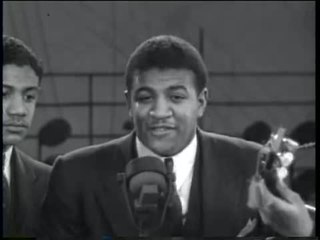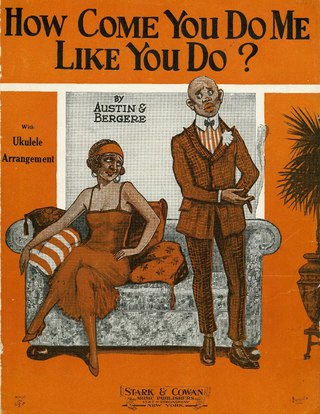
"The Saint Louis Blues" is a popular American song composed by W. C. Handy in the blues style and published in September 1914. It was one of the first blues songs to succeed as a pop song and remains a fundamental part of jazz musicians' repertoire. Benny Goodman, Louis Armstrong, Cab Calloway, Bing Crosby, Bessie Smith, Eartha Kitt, Count Basie, Glenn Miller, Guy Lombardo, Peanuts Hucko, and the Boston Pops Orchestra are among the artists who have recorded it. The song has been called "the jazzman's Hamlet". Composer William Grant Still arranged a version of the song in 1916 while working with Handy.
"(I'm) Confessin' " is a jazz and popular standard that has been recorded many times.
"Memories of You" is a popular song about nostalgia with lyrics written by Andy Razaf and music composed by Eubie Blake and published in 1930.
"On the Sunny Side of the Street" is a 1930 song composed by Jimmy McHugh with lyrics by Dorothy Fields. Some authors say that Fats Waller was the composer, but he sold the rights to the song. It was introduced in the Broadway musical Lew Leslie's International Revue starring Harry Richman and Gertrude Lawrence.

"Tiger Rag" is a jazz standard that was recorded and copyrighted by the Original Dixieland Jass Band in 1917. It is one of the most recorded jazz compositions. In 2003, the 1918 recording of "Tiger Rag" was entered into the U.S. Library of Congress National Recording Registry.
Shine is a popular song with lyrics by Cecil Mack and Tin Pan Alley songwriter Lew Brown and music by Ford Dabney. It was published in 1910 by the Gotham-Attucks Music Publishing Company and used by Aida Overton Walker in His Honor the Barber, an African-American road show. According to Perry Bradford, himself a songster and publisher, the song was written about an actual man named Shine who was with George Walker when they were badly beaten during the New York City race riot of 1900.

"The Way You Look To-night" is a song from the film Swing Time that was performed by Fred Astaire and composed by Jerome Kern with lyrics written by Dorothy Fields. It won the Academy Award for Best Original Song in 1936. Fields remarked, "The first time Jerry played that melody for me I went out and started to cry. The release absolutely killed me. I couldn't stop, it was so beautiful."
"Pennies from Heaven" is a 1936 American popular song with music by Arthur Johnston and lyrics by Johnny Burke. It was introduced by Bing Crosby with Georgie Stoll and his Orchestra in the 1936 film of the same name.

"Dinah" is a popular song published in 1925 and introduced by Ethel Waters at the Plantation Club on Broadway. It was integrated into the show Kid Boots. The music was written by Harry Akst and the lyrics by Sam M. Lewis and Joe Young. Hit versions in 1926 were by Ethel Waters, The Revelers, Cliff Edwards, and Fletcher Henderson.
"Autumn in New York" is a jazz standard and popular song composed by Vernon Duke in Westport, Connecticut in the summer of 1934. It was written without a commission or for a specific show, but Duke offered it to producer Murray Anderson for his Broadway musical Thumbs Up!. The play opened on December 27, 1934 where the song was performed by singer J. Harold Murray.

"Basin Street Blues" is a song often performed by Dixieland jazz bands, written by Spencer Williams in 1928 and recorded that year by Louis Armstrong. The verse with the lyric "Won't you come along with me / To the Mississippi..." was later added by Glenn Miller and Jack Teagarden.
"A Foggy Day" is a popular song composed by George Gershwin, with lyrics by Ira Gershwin. The song was introduced by Fred Astaire in the 1937 film A Damsel in Distress. It was originally titled "A Foggy Day " in reference to the pollution-induced pea soup fogs that were common in London during that period, and is often still referred to by the full title.
The commercial recording by Astaire for Brunswick was very popular in 1937.

"After You've Gone" is a 1918 popular song composed by Turner Layton with lyrics by Henry Creamer.
What's New?" is a 1939 popular song composed by Bob Haggart, with lyrics by Johnny Burke. It was originally an instrumental tune titled "I'm Free" by Haggart in 1938, when Haggart was a member of Bob Crosby and His Orchestra. The tune was written with a trumpet solo, meant to showcase the talents of band-mate Billy Butterfield. Crosby's orchestra recorded "I'm Free" the same day it was written.
"Rockin' Chair is a 1929 popular song with lyrics and music composed by Hoagy Carmichael. Musically it is unconventional, as after the B section when most popular songs return to A, this song has an A-B-C-A1 structure. Carmichael recorded the song in 1929, 1930, and 1956. Mildred Bailey made it famous by using it as her theme song. Like other 1920s standards, "Rockin' Chair" relied on the stereotypes of minstrelsy, citing "Aunt Harriet" from the anti-Uncle Tom song "Aunt Harriet Becha Stowe" (1853).
"You're Blasé" is a jazz standard composed in 1931 by Ord Hamilton (1900–1955) with lyrics by Bruce Sievier (1894–1953) and introduced by Binnie Hale in John Murray Anderson's production of the London musical revue Bow Bells (1932).

"How Come You Do Me Like You Do?" is a song written by vaudeville comedy duo Gene Austin and Roy Bergere in 1924. It has later been covered by many artists, and is considered a jazz standard.
"When It's Sleepy Time Down South", also known as "Sleepy Time Down South", is a 1931 jazz song written by Clarence Muse, Leon René and Otis René. It was sung in the 1931 movie Safe in Hell by Nina Mae McKinney, and became the signature song of Louis Armstrong, who recorded it almost a hundred times during his career. The song is now considered a jazz standard and it has been recorded by a plethora of artists. A popular recording in 1931 was by Paul Whiteman and his Orchestra.

The period from the end of the First World War until the start of the Depression in 1929 is known as the "Jazz Age". Jazz had become popular music in America, although older generations considered the music immoral and threatening to cultural values. Dances such as the Charleston and the Black Bottom were very popular during the period, and jazz bands typically consisted of seven to twelve musicians. Important orchestras in New York were led by Fletcher Henderson, Paul Whiteman and Duke Ellington. Many New Orleans jazzmen had moved to Chicago during the late 1910s in search of employment; among others, the New Orleans Rhythm Kings, King Oliver's Creole Jazz Band and Jelly Roll Morton recorded in the city. However, Chicago's importance as a center of jazz music started to diminish toward the end of the 1920s in favor of New York.








